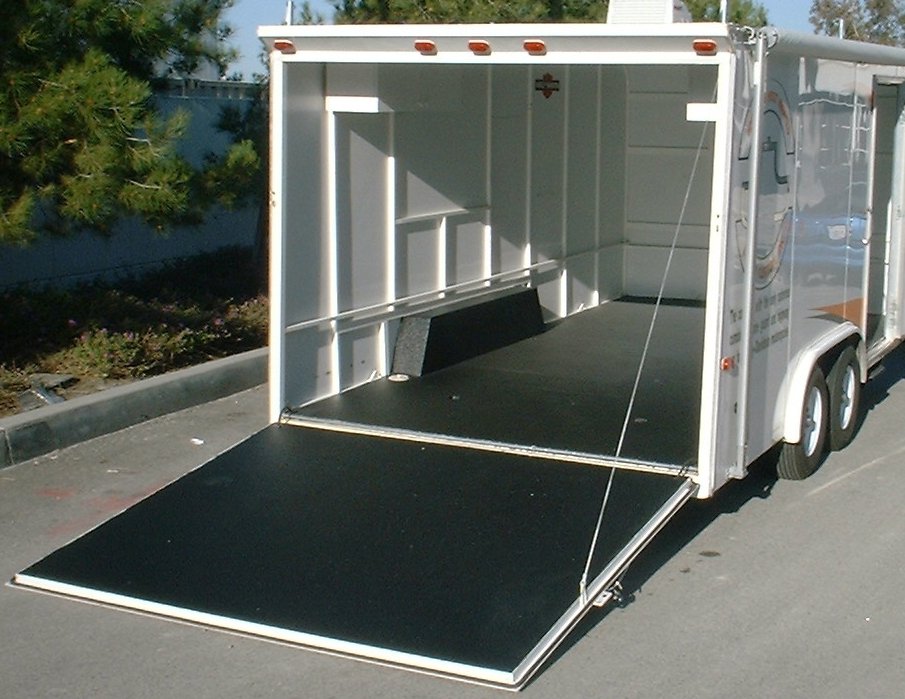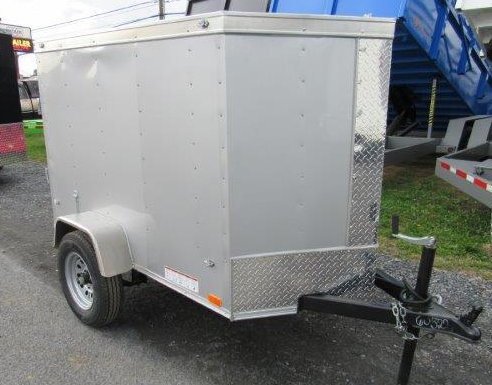7 Ways to Protect Your Tool Trailer From Water
September 1, 2021

A base tool trailer costs a lot of money, and it shouldn't fall apart quickly. Since most enclosed cargo trailers have wood walls and floors, consider taking some measures to keep water from causing rot in your wood and rust on your steel.
As You're Ordering Your Trailer...
There are a few options you can get from the dealer that will immediately protect you. These upgrades can keep water from getting in and also protect surfaces that will often have water resting on them in daily use.
Get Screwless Outside Panels
The exterior panels of an enclosed trailer can be attached in one of two ways:
- with screws
- without screws
The "with screws" method is as simple as it sounds:
Aluminum panels are lined up on the trailer's framing and screws are driven through the panels into the studs. If you've done carpentry work, then you know that sometimes you'll miss a stud when nailing or screwing, and this can happen with the "with screws" method. In the best cases, these panels are replaced or the holes are at least sealed. In the worst case, the builder will angle the screw over (like we've all done at some point) to tag the stud. Probably not so watertight.


The screwless method uses adhesive panels that stick on. There are far fewer holes in your trailer's body, and panels have more opportunity to expand and contract with the temperature.
Simply put, screwless enclosed trailers have a lot fewer holes and there are far fewer spots for water to enter your trailer.
No Rust With an Aluminum Frame
Most trailer frames are steel. Steel rusts. Once it rusts enough, your trailer isn't functional.
An aluminum frame is one of the more costly options for protecting your trailer. Depending on where you live, what the weather is like, and how your roads are treated, aluminum can be a good option. If you live in a place with lots of old cars driving around without too much rust, aluminum probably won't matter too much to you.

Aluminum can be helpful in reducing your trailer's weight. This is particularly important for a tool trailer. It's easy for most tool trailer builders to come right up against their trailer's GVWR after upfitting a trailer with shelves, drawers, tools, and materials.
Most tool trailers seem to gain weight over time, not lose it! If you're on the fence with aluminum, the weight savings it provides can give you a GVWR buffer for a typical tool trailer build that you might need.
After the Purchase
If you've already bought your trailer and you want to deal with water a little better, there are a few things that can really help you.
Seal the Bottom With Undercoating
Some manufacturers have special types of wood that are "treated" for moisture resistance. Some people seem to get by fine with this protection, but you can also get your trailer undercoated to protect both the wood floor and the steel frame.
Some manufacturers will provide this option at purchase, but you should make sure that they do a thorough job - we've seen budget trailers that had pretty bad (and expensive) undercoatings that didn't provide full coverage.
Seal the Inside With Bedliner
Similar to undercoating, you can also innercoat! You don't stop working in the rain, and this can mean tracking in water and mud. Some tradespeople just need the doors to be open for whatever the day's task is, and this means your ramp or rear of your trailer will get wet.
Truck bedliners can be applied to just about any surface, and will provide a waterproof, no-slip surface for you to work on. Bedliners will stick just fine to your tool trailer's plywood floor.

A typical spray-on bedliner will add 100-175 lbs to your trailer with full coverage on the floor and 6" up the walls.
You can fully spray your ramp or barn doors for even better protection.
Bedliners are available in lots of colors. Picking something brighter like gray or white will reflect light and keep your trailer looking well-lit.
Expel Moisture With Ventilation
Depending on your local climate you might have problems with moisture inside your tool trailer. Moisture can come from high humidity caused by climate, or just you spending a lot of time inside your trailer.
Often moisture in the air will condense on surfaces, and you can see this when you have small water droplets or light surface rust on metal tools or tables.

If you have a moisture problem, you can install a covered vent fan near the front of your trailer to get air moving. These fans are effective at getting wet air out, will keep your tools dry, and reduce the time you need to spend oiling hand tools and steel table surfaces.
Beef Up the Doors
Although doors that won't seal well can let in water, a bigger problem can be that your doors don't work as efficiently when the wood in and around them has been affected by moisture.
Poorly made trailer doors will wear faster and let water in sooner. Doors that aren't framed well will distort and flex during driving. Water that finds its way into hinge screw holes will loosen your hinges.
We've seen newer budget trailers that have significant door gaps after only a few thousand road miles.
You can improve your doors by making sure that the frames are square and stiff. If your hinges are loose you can:
- Replace them if the pins are worn.
- Move them if the mount holes are wearing.
- Add a couple more hinges per door to add more support.
Conclusion
Water can cause a lot of damage over time to wood and steel trailers. You've got lots of options to prevent rust and rot problems, both at the point of purchasing and post-purchase.
Get work trucks and tips in your mailbox.
Your time is precious. We write about organization, tools, and techniques that make tradespeople work faster and more efficiently. Subscribe to get our articles and tips in your inbox.
We will not spam you.